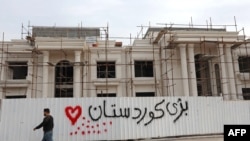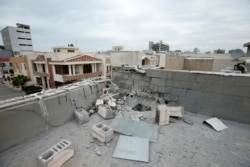A Shi'ite militant group calling itself Saraya Awlia al-Dam claimed responsibility on Tuesday for a rocket attack against a U.S. base in Iraqi Kurdistan’s capital city of Irbil that killed a U.S.-led coalition contractor and injured at least nine other people.
“We approached the base of the occupation, al-Harir, in Erbil at a distance of 7 km, and we were able to direct a devastating strike of 24 rockets, which hit their targets accurately, after the CRAM system and the occupiers' shells failed to intercept them,” the group said in a social media statement obtained by SITE Intelligence Group.
What is Saraya Awlia al-Dam?
Little is known about the Shi'ite militant group calling itself Saraya Awlia al-Dam, or Guardians of Blood Brigade. The group first appeared in Iraqi local news in late August 2020 after it allegedly carried out two separate attacks against U.S. forces pulling out of Camp Taji north of Baghdad.
The group, via the Telegram messaging app, in late January also claimed responsibility for an operation against U.S. forces in Dhiqar province, followed by another attack on U.S. logistics in western Basra.
According to Phillip Smyth, an analyst on Shi'ite militants at the Washington Institute for Near East Policy, the little-known group has demonstrated it has access to the weaponry that Iran has access to and gives to its Shi'ite proxies in the region.
“These groups are fronts for the Iranian proxies in terms of their strength. It comes down to what packages the Iranian proxies are trying to show the United States, to Kurdish elements, and to other regional actors,” Smyth told VOA.
In the past, attacks targeting American forces and its allies in Iraq were typically attributed to two known U.S.-designated Shi'ite radical groups, Asaib Ahl a-Haq and Kataib Hezbollah. However, analysts say more Shi'ite offshoot groups with similar anti-American rhetoric have appeared in Iraq since January 2020, when a U.S. airstrike killed Iranian top general Qasem Soleimani and Iraqi Shi'ite leader Abu Mahdi al-Muhandis.
“I think the bigger issue is what networks are the Iranians using. … There are front groups that utilize a number of different networks. So, you have different networks that are near Iraqi Kurdistan, which are run by Kataib Sayyid al-Shuhada or Kataib Hezbollah or the Badr Organization,” Smyth added.
Kurds point to PMF
Kurdish officials have called the attack, which reportedly also injured three Kurdish civilians, a terrorist act conducted by “a group” linked to the Popular Mobilization Forces (PMF).
Mahmud Muhammad, the spokesman of ruling Kurdistan Democratic Party, said in a statement Tuesday that the attackers were “a lawless group on the side of PMF and with its capacity and uniform.”
The PMF is an umbrella organization made up of tens of thousands of Iraqi Shi'ite fighters recruited mostly in 2014 to fight the Sunni militant Islamic State (IS). In late 2016, the Iraqi parliament enacted a law granting the PMF formal recognition as an autonomous branch of the Iraqi security forces and entitled it to government aid.
Nuri Hama Ali, the Kurdish peshmerga commander for Kirkuk-Pirde front, held the Iraqi government responsible for restraining “certain groups within PMF” who are targeting the KRG security.
“Irbil is safe for all our allies, as well as religious and ethnic groups living in Kurdistan. The city is respected and loved by its people. That is why our enemies cannot stand the capital of Kurdistan region,” Ali told VOA.
Both PMF and its supporter, Iran, have publicly denied involvement in the attack.
Iranian foreign ministry spokesperson Saeed Khatibzadeh said in a statement quoted by Iranian state media outlet IRNA that he condemned “suspicious attempts to link the Irbil attacks to Iran.”
Sirwan Kajjo from Washington and Dilshad Anwar from Kirkuk, Iraq, contributed to this report.


